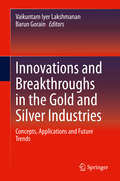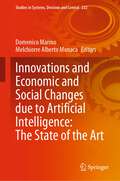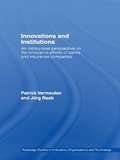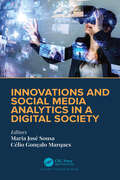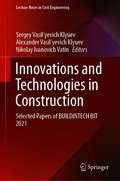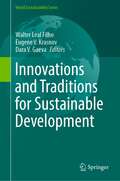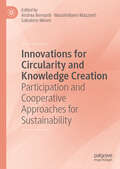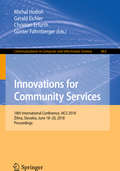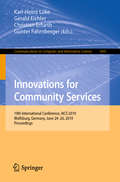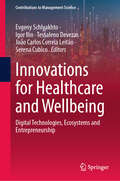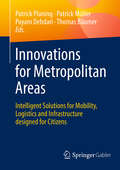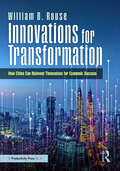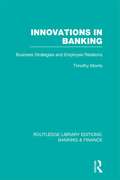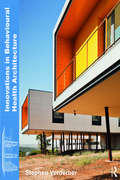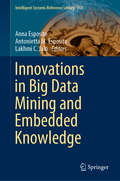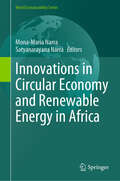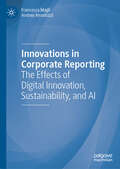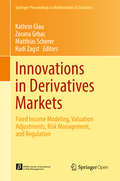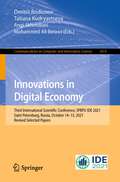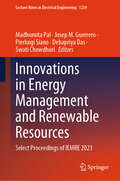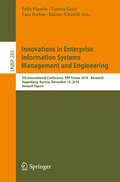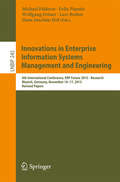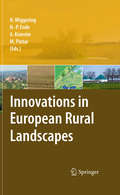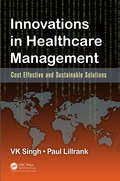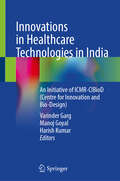- Table View
- List View
Innovations and Breakthroughs in the Gold and Silver Industries: Concepts, Applications and Future Trends
by Vaikuntam Iyer Lakshmanan Barun GorainThe book describes all aspects of technical innovation related to the gold and silver industries, from ore identification through to processing. It includes details of comminution, pre-concentration and beneficiation, commercially available and recently developed innovative pyro and hydrometallurgical processes, including leaching processes, separation and purification, and recovery and refining. The book focuses on capital and operating cost estimation, process simulation, waste remediation and minimization. Sustainable gold and silver processes are examined with the use of clean technologies and efficient use of energy and water. Topics such as supply and demand of gold and silver, their exchange in major global markets, and the factors that influence gold and silver prices and major economic indices are discussed.Presents emerging trends and innovations in the areas of ore body knowledge, mining, processing, waste management, economics, finance and automation;Describes emerging enablers for the gold and silver industries such as digitization, automation and remote operations;Promotes breakthroughs in mining, processing, waste management, energy and water from an integrated operations perspective.
Innovations and Economic and Social Changes due to Artificial Intelligence: The State of the Art (Studies in Systems, Decision and Control #222)
by Domenico Marino Melchiorre Alberto MonacaThe book aims to deal with the main advances in the study of artificial intelligence, the digital and circular economy, and innovation from a multidisciplinary perspective. Whoever governs the artificial intelligence will hold the keys to the world and the future. This book explains the growing role of artificial intelligence in our lives and the need to understand its mechanisms. The book presents original research articles addressing various aspects of artificial intelligence applied to economics, law, management, and optimization. The topics discussed include economics, territorial policies, law, resource allocation strategies, information technology, and learning for inclusion. Combining the input of contributing professors and researchers from Italian and other foreign universities, the book is of interest to students, researchers, and practitioners, as well as members of the public in general, interested in the world of the artificial intelligence and economics.
Innovations and Institutions: An Institutional Perspective on the Innovative Efforts of Banks and Insurance Companies (Routledge Studies In Innovation, Organizations And Technology Ser. #4)
by Patrick Vermeulen Jorg RaabUsing institutional theory to explain innovation and merging academic and critical analysis with practical recommendations, this book provides a full and rich account of how new products are brought to market; considering both the successes and failures in equal measure.This book takes the meeting point of two seemingly incongruous schools of theor
Innovations and Social Media Analytics in a Digital Society
by Maria José Sousa and Célio Gonçalo MarquesRecent advances in digitization are transforming healthcare, education, tourism, information technology, and some other sectors. Social media analytics are tools that can be used to measure innovation and the relation of the companies with the citizens. This book comprises state-ofthe-art social media analytics, and advanced innovation policies in the digitization of society. The number of applications that can be used to create and analyze social media analytics generates large amounts of data called big data, including measures of the use of the technologies to develop or to use new services to improve the quality of life of the citizens. Digitization has applications in fields from remote monitoring to smart sensors and other devices. Integration generates data that need to be analyzed and visualized in an easy and clear way, that will be some of the proposals of the researchers present in this book. This volume offers valuable insights to researchers on how to design innovative digital analytics systems and how to improve information delivery remotely.
Innovations and Technologies in Construction: Selected Papers of BUILDINTECH BIT 2021 (Lecture Notes in Civil Engineering #151)
by Sergey Vasil’yevich Klyuev Nikolay Ivanovich Vatin Alexander Vasil’yevich KlyuevThis book gathers the latest advances, innovations, and applications in the field of building design and construction, as presented by researchers and engineers at the International Conference BUILDINTECH BIT 2021, Innovations and Technologies in Construction, held in Belgorod, Russia, on March 9-10, 2021. It covers highly diverse topics, including building materials, industrial and civil construction, structural mechanics and theory of structures, computational methods and IT in construction, organization and technologies of construction production. The contributions, which were selected by means of a rigorous international peer-review process, highlight numerous exciting ideas that will spur novel research directions and foster multidisciplinary collaborations.
Innovations and Traditions for Sustainable Development (World Sustainability Series)
by Walter Leal Filho Eugene V. Krasnov Dara V. GaevaThis book highlights the vital necessity for combining sustainable development processes from different areas, with applications in areas such as science, education and production sectors. These sectors have previously been separated by linguistic and technological barriers. Breaking down these barriers will allow an interdisciplinary and transdisciplinary flow of information, leading to greater efficiency, and towards a more real resilient and sustainable economy development. This book fills in the gap in respect of publications addressing aspects of innovation and sustainable development and focuses on a range of areas, such as I. Gradual transition to innovative development; II. Continuity of technology in education, science and industry; III. Convergency directions, interdisciplinary relations in scientific research; IV. Digital technologies for sustainable development; V. Global trends and regional aspects of innovation and traditions in environmental management; VI. International legal regulations and environmental and economic relations among business communities. The publication fosters the global efforts towards taking better advantage of the many opportunities which innovation in specific areas may offer.
Innovations for Circularity and Knowledge Creation: Participation and Cooperative Approaches for Sustainability
by Massimiliano Mazzanti Andrea Bernardi Salvatore MonniCo-operatives are increasingly being recognized as important contributors to inclusive, sustainable and fair development. However, the co-operative movement faces a multitude of challenges, including the lack of access to credit. This book presents existing cases and new examples of the intersection between the co-operative economy and sustainability challenges. Chapters explore innovative circular and low carbon sustainable economy cases and practical examples of the role of co-operative organizations within the European Union. It asks how policy factors influence sustainability innovations, explores the role of workers’ involvement in firm strategies and analyses the management style of cooperative firms in facing sustainability challenges. This book will be an essential resource for scholars and students of sustainability and the circular economy, innovation management, HRM and labour studies.
Innovations for Community Services: 18th International Conference, I4CS 2018, Žilina, Slovakia, June 18-20, 2018, Proceedings (Communications in Computer and Information Science #863)
by Günter Fahrnberger Gerald Eichler Christian Erfurth Michal HodoňThis book constitutes the refereed proceedings of the 18th International Conference on Innovations for Community Services, I4CS 2018, held in Žilina, Slovakia, in June 2018.The 14 revised full papers and the three revised short papers presented in this volume were carefully reviewed and selected from 38 submissions. The papers are organized in topical sections on architectures and management; data analytics and models; community and public collaboration; innovations and digital transformation.
Innovations for Community Services: 19th International Conference, I4CS 2019, Wolfsburg, Germany, June 24-26, 2019, Proceedings (Communications in Computer and Information Science #1041)
by Günter Fahrnberger Gerald Eichler Christian Erfurth Karl-Heinz LükeThis book constitutes the refereed proceedings of the 19th International Conference on Innovations for Community Services, I4CS 2019, held in Wolfsburg, Germany, in June 2019. The 16 revised full papers presented in this volume were carefully reviewed and selected from 43 submissions. The papers are organized in topical sections on communication systems; teaching and collaboration; smart cities; innovations and digital transformation; data analytics and models; community and quality.
Innovations for Healthcare and Wellbeing: Digital Technologies, Ecosystems and Entrepreneurship (Contributions to Management Science)
by Tessaleno Devezas Serena Cubico Igor Ilin João Carlos Correia Leitão Evgeny SchlyakhtoVarious socio-demographic, medical, technological, and managerial trends determine the emergence and development of the concept of the “Smart Hospital”, as well as the development and implementation of appropriate complex architectural models in the management practice of medical organizations. In turn, such medical organizations require an innovative health care ecosystem to provide medically and economically efficient healthcare services. This book examines various approaches to the modern healthcare system to provide an effective internal environment for the medical organization as well as an effective external environment for better interaction with all stakeholders of the greater healthcare system. It addresses the challenges of digital technology adoption in specialized areas (e.g., cardiology, surgery, neonatology, etc.) and of the dissemination of knowledge, technology, innovation, and entrepreneurial initiatives as well as communication between stakeholders. It then explores the development of the Smart Hospital by analyzing the internal architecture of medical organizations, key factors of their transformation, architecture of IT and digital technologies and data-driven management. Finally, this book explores the ways in which entrepreneurship and entrepreneurial leadership promote innovation and well-being in different organizational contexts, with special emphasis on human resource management, intellectual capital, and abusive leadership of public, social, and business sector contexts.
Innovations for Metropolitan Areas: Intelligent Solutions for Mobility, Logistics and Infrastructure designed for Citizens
by Patrick Müller Patrick Planing Payam Dehdari Thomas BäumerThis book presents human-centered concepts and solutions for mobility, logistics and infrastructure that will make our growing metropolitan areas more livable and sustainable.The still accelerating megatrend of urbanization is leading to constantly growing metropolitan areas. This creates a whole series of challenges for municipalities, as well as citizens, such as overcrowded traffic routes, limited building space and an increasingly difficult supply situation. With this book we want to answer the following question: How can people live in densely populated areas and meet their needs in terms of mobility, freedom, self-determination, security, prosperity, communication or in other words: how can metropolitan regions be made humane? The answer to this question requires innovative ideas and approaches in various areas:Sustainable designs of infrastructureEconomically and ecologically efficient logistics and mobility approachesIntelligent applications for navigation and communicationAll these ideas must be measured against the needs of citizens and should thus be developed following a human-centered design approach. This ensures that innovative solutions will be widely accepted by the public. In addition, they also have the potential to turn citizens into active co-designers of future metropolitan areas.
Innovations for Transformation: How Cities Can Reinvent Themselves for Economic Success
by William B. RouseThis book chronicles how four resort cities (Asheville, Aspen, Key West and Laguna Beach) addressed failing economic situations to reinvent themselves and prosper. The author explores bottom-up reinventions of local community value propositions, often driven by economic forces that require reinvention due to declining or disappearing traditional economic opportunities. The author foregoes broad national policies and focuses on a wide range of citizen groups, local institutions and businesses that coalesce to understand what is happening or has happened to their community. These cities then formulate future aspirations with new value propositions and experiment to determine what works. The investment becomes focused on emergent successes. The book addresses four community ecosystems and a spectrum of contexts—For example, mountains vs. oceans and venues for entertainment vs. thought leadership. These four ecosystems were reinvented creatively to enable great economic and societal successes. In particular, the energy provided by bottom-up innovation was crucial. The information presented in this book is drawn from two sources—First, historical accounts of such initiatives are leveraged. Second, and more substantial are findings synthesized from extensive interviews in Asheville, NC.
Innovations in Banking: Business Strategies and Employee Relations (Routledge Library Editions: Banking & Finance)
by Tim MorrisBanking and finance is one of the most successful and rapidly expanding sectors in the world economy. From the 1960s this whole area of employment has undergone profound changes. The banks diversified, adopted new corporate strategies, introduced new technologies and faced new and intense competition. This book examines the importance of employee relations strategies in contributing to a prosperous industry. Drawing upon a wide range of original and undocumented material derived from the banks and the unions, it explores both employer and union strategies and examines the continuing competition for predominance between the ‘orthodox’ trade unions and the staff associations.
Innovations in Behavioural Health Architecture
by Stephen VerderberInnovations in Behavioural Health Architecture is the most comprehensive book written on this topic in more than 40 years. It examines the ways in which healthcare architecture can contribute, as a highly valued informational and reference source, to the provision of psychiatric and addictive disorder treatment in communities around the world. It provides an overview of the need for a new generation of progressively planned and designed treatment centres – both inpatient and outpatient care environments – and the advantages, challenges, and opportunities associated with meeting the burgeoning need for treatment settings of this type. Additional chapters address the specifics of geriatric psychiatry and its architectural ramifications in light of the rapid aging of societies globally and provide a comprehensive compendium of planning and design considerations for these places in both inpatient and outpatient care contexts. Finally, the book presents an expansive and fully illustrated set of international case studies that express state-of-the-art advancements in architecture for behavioural healthcare.
Innovations in Big Data Mining and Embedded Knowledge (Intelligent Systems Reference Library #159)
by Lakhmi C. Jain Anna Esposito Antonietta M. EspositoThis book addresses the usefulness of knowledge discovery through data mining. With this aim, contributors from different fields propose concrete problems and applications showing how data mining and discovering embedded knowledge from raw data can be beneficial to social organizations, domestic spheres, and ICT markets. Data mining or knowledge discovery in databases (KDD) has received increasing interest due to its focus on transforming large amounts of data into novel, valid, useful, and structured knowledge by detecting concealed patterns and relationships. The concept of knowledge is broad and speculative and has promoted epistemological debates in western philosophies. The intensified interest in knowledge management and data mining stems from the difficulty in identifying computational models able to approximate human behaviors and abilities in resolving organizational, social, and physical problems. Current ICT interfaces are not yet adequately advanced to support and simulate the abilities of physicians, teachers, assistants or housekeepers in domestic spheres. And unlike in industrial contexts where abilities are routinely applied, the domestic world is continuously changing and unpredictable. There are challenging questions in this field: Can knowledge locked in conventions, rules of conduct, common sense, ethics, emotions, laws, cultures, and experiences be mined from data? Is it acceptable for automatic systems displaying emotional behaviors to govern complex interactions based solely on the mining of large volumes of data? Discussing multidisciplinary themes, the book proposes computational models able to approximate, to a certain degree, human behaviors and abilities in resolving organizational, social, and physical problems. The innovations presented are of primary importance for: a. The academic research community b. The ICT market c. Ph.D. students and early stage researchers d. Schools, hospitals, rehabilitation and assisted-living centers e. Representatives from multimedia industries and standardization bodies
Innovations in Circular Economy and Renewable Energy in Africa (World Sustainability Series)
by Mona-Maria Narra Satyanarayana NarraIn many African countries, access to electricity and modern energy fuels remains a significant concern. Over 570 million people in Sub-Saharan Africa still lack electricity, and only 18% have access to modern cooking fuels. The region faces immense challenges, including massive debts, lack of maintenance, and system failures, underscoring the urgent need for investment in the energy sector's transition. Africa's overreliance on fossil fuels and the growing demand for energy, driven by economic expansion and population growth, could lead to sharp increases in greenhouse gas emissions. Meanwhile, urbanization, economic activities, and rising living standards are increasing waste production, making waste management a pressing issue. The absence of adequate waste treatment technologies, financing, and regulatory frameworks exacerbates this challenge. Biomass remains a predominant energy source in Sub-Saharan Africa, often used in its raw state, leading to health hazards from incomplete combustion. However, the continent's abundant agricultural residues and other energetic wastes offer a significant opportunity. These can be transformed into various energy carriers, helping to meet or supplement Africa's energy and fuel needs. The current situation presents a unique opportunity for Africa to shift from a fossil-based economy to a sustainable green economy. Leveraging technology, knowledge, and skills can support this rapid transition and drive economic growth. Innovations in Circular Economy and Renewable Energy highlights current advancements in waste management, biomass utilization for energy, and innovations in green hydrogen production in Africa. This book showcases predominantly African research and insights first presented at the "First International Conference on Circular Economy, Renewable Energy, and Green Hydrogen" in Kumasi, Ghana, in September 2023. Dive into this essential resource to explore transformative waste-to-energy technologies, the hybridization and flexibilization of renewable energy systems, and the path towards a sustainable future for Africa.
Innovations in Corporate Reporting: The Effects of Digital Innovation, Sustainability, and AI
by Francesca Magli Andrea AmaduzziThis book analyses the current trends and innovations of corporate reporting, including digitalization, sustainability, and artificial intelligence. Corporate habits and cultural changes have also brought new needs in practice and regulation, both mandatory and voluntary. The book examines national and international regulations and the various types of accounting standards (financial and non-financial). It addresses the journey of financial and non-financial data’s rise in importance, including areas such as sustainability, technology, and simplification, and explores these effects on business. It will be of interest to researchers and students in accounting, corporate reporting, and corporate finance.
Innovations in Derivatives Markets
by Zorana Grbac Kathrin Glau Matthias Scherer Rudi ZagstThis book presents 20 peer-reviewed chapters on current aspects of derivatives markets and derivative pricing. The contributions, written by leading researchers in the field as well as experienced authors from the financial industry, present the state of the art in: * Modeling counterparty credit risk: credit valuation adjustment, debit valuation adjustment, funding valuation adjustment, and wrong way risk. * Pricing and hedging in fixed-income markets and multi-curve interest-rate modeling. * Recent developments concerning contingent convertible bonds, the measuring of basis spreads, and the modeling of implied correlations. The recent financial crisis has cast tremendous doubts on the classical view on derivative pricing. Now, counterparty credit risk and liquidity issues are integral aspects of a prudent valuation procedure and the reference interest rates are represented by a multitude of curves according to their different periods and maturities. A panel discussion included in the book (featuring Damiano Brigo, Christian Fries, John Hull, and Daniel Sommer) on the foundations of modeling and pricing in the presence of counterparty credit risk provides intriguing insights on the debate.
Innovations in Digital Economy: Third International Scientific Conference, SPBPU IDE 2021, Saint Petersburg, Russia, October 14–15, 2021, Revised Selected Papers (Communications in Computer and Information Science #1619)
by Dmitrii Rodionov Tatiana Kudryavtseva Mohammed Ali Berawi Angi SkhvedianiThis book constitutes the revised selected papers of the Third International Conference on Innovations in Digital Economy, SPBU IDE 2021, held in St. Petersburg, Russia, in October 2021.The 23 papers presented were thoroughly reviewed and selected for publication from 153 submissions. The papers are organized according the following topical sections: economic efficiency and social consequences of digital innovations implementation; regional innovation systems and clusters as drivers of the economic growth during the Fourth Industrial Revolution; industrial, service and agricultural digitalization; response of an educational system and labor market to the digital-driven changes in the economic system; digital transformation trends in the government and financial sector.
Innovations in Energy Management and Renewable Resources: Select Proceedings of IEMRE 2023 (Lecture Notes in Electrical Engineering #1239)
by Pierluigi Siano Josep M. Guerrero Swati Chowdhuri Madhumita Pal Debapriya DasThis book offers insights into the 3rd International Conference on Innovations in Energy Management and Renewable Resources, IEMRE 2023. It focuses on various aspects of renewable energy, including solar, wind, hydro, biomass, and other renewable-based energy systems. Additionally, it covers energy storage and management, smart grid technologies, renewable energy expansion, and policymaking. The book is a valuable resource for anyone interested in energy management and renewable resources.
Innovations in Enterprise Information Systems Management and Engineering
by Verena Geist Felix Piazolo Lars Brehm Rainer SchmidtThis book constitutes revised and peer reviewed contributions from the Research part of the ERP Future 2016 conference held in Hagenberg, Austria, in November 2016. The ERP Future Research conference is set up as a platform for scientific discussion on enterprise resource planning (ERP) systems, business intelligence (BI) systems, business process management (BPM) systems and information technology systems. The conference acts as a discussion and communication platform for business and technological topics covering ERP systems. The 7 full and 5 short papers presented in this volume were carefully reviewed and selected from 29 submissions. They were organized in the following topical sections: introduction of enterprise systems; business processes; production processes; and IT-trends.
Innovations in Enterprise Information Systems Management and Engineering
by Michael Felderer Felix Piazolo Wolfgang Ortner Lars Brehm Hans-Joachim HofThis volume presents the revised and peer reviewed contributions of the ERP Future 2015 conference held in Munich, Germany on November 16-17, 2015. The ERP Future 2015 Research conference is a scientific platform for research on enterprise information systems in general and specifically on core topics like business process management (BPM), business intelligence (BI) and enterprise resource planning (ERP) systems. Besides the scientific community the event also addresses businesses developing, implementing and using enterprise information systems. The 7 full papers and 5 short papers accepted for ERP were selected from 23 submissions. The papers consider topics in education in enterprise systems; business process management; enterprise systems and solution providers; and IT-trends. "
Innovations in European Rural Landscapes
by Hubert Wiggering Marina Pintar Hans-Peter Ende Andrea KnierimRural regions in Europe are evolving under powerful boundary conditions such as globalisation, socio-cultural transformations and climate change, which in turn increases natural hazards. The regional land use and the evolvement of landscapes is increasingly shaped trends and drivers like infrastructural, energy or housing needs, globalised agricultural markets, and consumption habits. To face these challenges and to balance competitiveness with social cohesion, the "InnoLand research and development network" induces and accompanies promising land use innovations at the landscape scale in 10 European rural regions. Based on a common conceptual approach among the InnoLand partners, the development and implementation of new competitive strategies is conducted as a science-practice dialogue with strong commitment to the regional policy design for rural development. With this book, the network partners provide an overview and a comparative analysis of selected experimental regional approaches and give examples for the successful tackling of future opportunities and threats.
Innovations in Healthcare Management: Cost-Effective and Sustainable Solutions
by Paul Lillrank Vk SinghAs developed economies enter a period of slower growth, emerging economies such as India have become prime examples of how more can be achieved with less. Bringing together experience and expertise from across the healthcare industry, this book examines innovations that can bring about real advances in the healthcare industry. Innovations in H
Innovations in Healthcare Technologies in India: An Initiative of ICMR-CIBioD (Centre for Innovation and Bio-Design)
by Harish Kumar Varinder Garg Manoj GoyalThis book provides an overview of the futuristic healthcare ecosystem, covering numerous beneficial medical devices such as tele healthcare kiosks 101 and 201, JEE-1 (Automatic ambu-bag), medical rambler, surgical snorkel masks, metallo surfactants, etc., to improve the healthcare sector. It aids medical practitioners in understanding the advantages of accessible, affordable, and sustainable healthcare innovations, offering insights into groundbreaking technologies that can revolutionize healthcare. Each chapter addresses significant challenges in healthcare, also discussing the integration of technology and its potential benefits. The book also provides a deeper understanding of these transformative devices, exploring accessibility to ensure care for all, regardless of geographic or economic constraints. Additionally, it explains how sustainable devices can reduce environmental impact and cut long-term costs for healthcare institutions, providers and seekers.The book is relevant for medical practitioners, engineers, healthcare institutes, researchers, scientists, industry partners, students, and common people to understand the power of innovative devices for efficient patient care.
